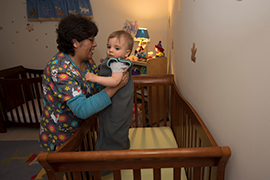 Even the best planned child care arrangements can be disrupted from time to time. Without emergency care, more commonly known as back-up care, working parents may be forced to stay home or bring their child to work with them. By planning ahead and knowing your options, you can be prepared to meet the unexpected.
Even the best planned child care arrangements can be disrupted from time to time. Without emergency care, more commonly known as back-up care, working parents may be forced to stay home or bring their child to work with them. By planning ahead and knowing your options, you can be prepared to meet the unexpected.
Back-up care may be needed whenever your regular child care arrangements are not available. Back-up care can be used when either your child or your provider is ill, when providers are on vacation, resign, or go out of business, when schools are closed, or any situation in which your regular child care arrangements fall through.
Work Considerations
For two parent families, the best place to begin is to talk with your spouse or partner ahead of time about your individual work schedules. Decide who can stay home and when. Be sure you know your time-off options at work so you will be ready when your child is under the weather or an emergency arises.
Be sure you know all the policies at your job regarding time off, sick time and flexibility in your hours at work. You may want to speak with your manager to arrange how your work will be done during your absence.
Ask your employer about back-up care. More and more businesses are realizing that by helping employees when child care arrangements break down or children are ill, they reduce unscheduled absences and create savings for the company. Some employers subsidize a portion of the cost of back-up care for their employees. Sometimes companies sponsor arrangements by setting aside back-up child care slots in the community, having a program at the work site, or providing a service to come into an employee's home.
Check It Out
If you haven't already asked, now is the time to find out how your regular provider can help. Ask about policies for ill children, scheduled closed days, and substitute care. Discuss with your caregiver your need for as much notice as possible and whether she has any friends who might be able to help you in a pinch.
Whether you're going to use a drop-in center or temporary caregivers, it's a good idea to call and schedule a visit. Both you and your child will feel more comfortable on the day you need care if you've made the time to visit beforehand. Many programs are open early in the morning and early evening which may be more convenient times for you to visit.
Visit as many potential caregivers as possible. Let your child explore as you ask questions to determine whether you're comfortable with the quality of care. Just as you searched for regular child care, you will be looking for a safe, healthy, and comfortable place to leave your child.
Your Child Is Ill
Children inevitably get sick and for working parents these illnesses can cause great difficulty. It can be tough to judge if your child is too ill to attend your regular child care program. Ask yourself if your child can participate comfortably and whether his needs will not interfere with the care of the other children. Be familiar with your child care program's policies on illness. Do not pressure your caregivers to take your sick child as it is their responsibility to maintain a healthy environment for all the children enrolled.
Some communities have a range of options for you to consider: specialized centers for mildly ill children, in-home caregiver services, Visiting Nurse Services, home health agencies, or nanny placement agencies. Some family child care providers and child care centers may provide temporary care. If your child is very sick you will want to be with her.
Your child care provider has an emergency... the school boiler just burst... your child is mildly ill. Whatever the reason, you have to work and have a need for back-up care.
Transitions
When Would I Need Back-up Care?
- your child is ill
- your regular caregiver is ill, on vacation, or has a sudden emergency
- your regular child care arrangements break down and you need time to find a new arrangement
- your child's school or center is closed for a holiday, vacation, teacher training, inclement weather or emergency
- unexpected circumstances such as travel for work, overtime, car trouble
Resources
At the same time you set up your regular child care, begin to consider your options for back-up care. Start right away. It is inevitable your child care will break down at some point. You may need to use a combination of options to provide care. For example, you could choose in-home care for when your child is ill, a program provided by your employer for a snow day, and a community program for school holidays.
Consider which of your relatives, friends or neighbors might be available to help you on an emergency basis. Talk to them about when it might be appropriate for you to call them. In some situations you may be able to find another parent who is willing to help you out in exchange for some weekend or evening hours.
Call your local Child Care Resource and Referral (CCR&R). Find the CCR&R that covers your area by calling Child Care Aware at 1(800) 424-2246. Ask your CCR&R about providers in your community that provide back-up care. Discuss your specific needs and what options are available for your family. Some programs provide care on an emergency care basis and others are specifically designed for holidays and school vacations.
There may be back-up child care centers in your area for you to look at. Often these centers are for employees of a particular company but they may have some slots open to the public. Some regular child care centers may also offer back-up care on a limited basis.
Some family child care providers may be able to take your child because of part-time attendance by other children. Your community may also have in-home or nanny agencies to care for your child when she is sick.
Tips To Be Prepared
- Find more than one back-up care arrangement.
- Visit as many potential back-up child care arrangements as possible with your child.
- Keep a file of providers with their phone numbers and available hours.
- Have copies of paperwork such as birth certificates and immunization records ready.
- Organize a list and make extra copies of important family information such as phone numbers and addresses, your child's allergies, sleep patterns, and favorite activities.
- Complete preregistration materials for programs that require advance paperwork.
- Know your employer's policies around your taking time off from work.
The Daily Parent is prepared by NACCRRA, the National Association of Child Care Resource and Referral Agencies.
© 2012 NACCRRA. All rights reserved.





